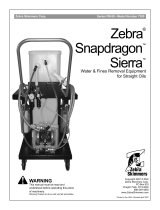Page is loading ...

Pressure Regulating Valves
Installation, operating and maintenance instructions
Emerson reserves the right to change the contents without notice CAVMC-6604-EN-1306
2. Handling
This pressure regulating valve is designed to automatically reduce a high initial inlet pressure
to a lower delivery pressure. The valve should be handled with care, not subjected to heavy shock
loads, and protected to prevent contamination getting inside. It should be installed in accordance
with industry standards and local codes. Failure to do so could result in property damage or serious
injury to personnel.
3. Installation
1. Always wear proper safety equipment, including safety glasses.
2. It is highly recommended that a strainer is installed upstream of the valve.
3. The valve should be installed in the horizontal position with the spring chamber upright. If
another mounting position is required, please consult the factory.
4. For ease of operation and maintenance, it is suggested that manual shut-off valves be installed
upstream and downstream from the valve.
5. Before installing the valve, the piping and valve should be thoroughly flushed out to remove any
foreign material.
6. Install the valve with the inlet pipe fitted to the inlet connection identified on the valve body.
7. For threaded valves, to prevent sealing compound from entering and damaging the valve,
apply a small amount of pipe thread sealing compound to external threads only. Do not put
any sealing compound on the first thread or on any internal threads, as doing so may cause
the sealing compound to enter the valve and cause seat leakage. Do not use the valve body or
spring chamber for installing the valve in threaded connections. Use the wrench flats provided to
tighten the valve to the connection pipe, and do not over tighten.
Torque valve connections enough to ensure a pressure tight seal.
8. Do not paint, lubricate or allow contaminates to enter or cover the interior or any working parts
of the valve.
4. Operation
The regulator’s delivery pressure setting is adjusted by turning the adjusting screw at the top of the
spring chamber after loosening the adjusting screw lock nut.
To increase the delivery pressure, turn the adjusting screw clockwise (into the spring chamber).
To decrease the delivery pressure, turn the adjusting screw counter-clockwise (out of the spring
chamber).
Tighten the adjusting screw lock nut after adjustments have been made.
Draw flow through the valve and shutoff, after adjustment, to check for proper downstream set
pressure.
5. Maintenance
Maintenance should be performed on a regular basis. An initial inspection interval of 12 months is
recommended. Depending on the service conditions and the condition of the valve, the inspection
interval may be decreased or increased. Inspect valve to ensure it is functioning as intended. Use
only Cash Valve parts for repair.
More information is available at www.cashvalve.com
WARNING
Any attempt to repair or modify this product by unqualified personnel voids the product
guarantee and may cause serious damage to equipment, personal injury, and death.
Cash Valve is not liable for any damage resulting from misuse or misapplication of its
products.
1. Pre-installation
Verification of model and service
media/temperature/pressure limits
Verify the model number, set pressure, and
spring range on the nameplate against the
order.
For European service, verify the “CE” mark
has been stamped on the nameplate. Verify
that the system pressure will not exceed
the maximum inlet pressure marked on the
nameplate.
CASH VALVE
www.valves.emerson.com
/

